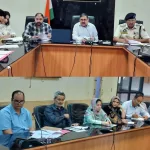In a region marred by decades of conflict, Justice Sanjay Kishan Kaul’s recommendation for the establishment of an impartial truth and reconciliation commission stands as a beacon of hope. His proposal to investigate and report on human rights violations by both State and non-State actors in Jammu & Kashmir since the 1980s, alongside measures for reconciliation, is a crucial step towards healing the wounds of the past and rebuilding a fractured society.
Justice Kaul’s call for such a commission underscores the gravity of the situation and the urgent need for healing. The scars of conflict run deep in Kashmir, affecting generations and eroding the social fabric that once epitomized coexistence, tolerance, and mutual respect. By acknowledging the historical harmony of the region, Justice Kaul highlights the imperative to restore these principles for a peaceful future.
As a native of Jammu & Kashmir, Justice Kaul’s personal observations lend weight to his advocacy for reconciliation. He aptly emphasizes the intergenerational trauma and the erosion of social cohesion, signaling the pressing need for action. His plea to expedite the establishment of the commission before memories fade is a poignant reminder of the fleeting nature of time in addressing past injustices.
Drawing inspiration from South Africa’s ubuntu philosophy, Justice Kaul advocates for inclusiveness and humanity at the core of the reconciliation process. This approach, grounded in forgiveness and shared identity, offers a path towards healing fractured communities and fostering a sense of belonging. By prioritizing dialogue and diverse perspectives, Justice Kaul emphasizes the importance of a holistic and participatory approach to truth and reconciliation.
However, Justice Kaul also cautions against the commission morphing into a criminal court, stressing the importance of a humanized and personalized process. His emphasis on creating a safe space for individuals to share their experiences underscores the need for empathy and understanding in the pursuit of truth and justice. It is through such open dialogue and mutual respect that the commission can fulfill its mandate of reconciliation.
Justice Kaul’s vision extends beyond the commission itself, recognizing it as one of many avenues towards systemic reform. He envisions a future where Kashmiris can embrace the past with dignity, welcoming back those who were compelled to migrate. His optimism for the future reflects a belief in the resilience of the Kashmiri people and their capacity to chart a path towards peace and prosperity.
In conclusion, Justice Sanjay Kishan Kaul’s recommendation for a truth and reconciliation commission offers a ray of hope in the quest for peace in Jammu & Kashmir. By acknowledging the past, facilitating dialogue, and fostering inclusiveness, the commission has the potential to heal wounds, restore trust, and pave the way for a brighter future. It is a testament to Justice Kaul’s commitment to justice, humanity, and the enduring spirit of Kashmir.
(Author is Socio-political Activist from Anantnag J&K. Feedback: [email protected]





